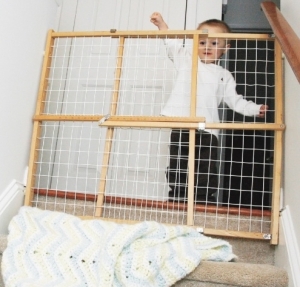Local group working to improve child safety
By Phyllis Moore
Published in News on March 4, 2009 1:46 PM

News-Argus/GREG SOUSA
Twenty-three-month-old Nico Pietrangelo stands behind a gate at the top of the stairs in his home on Saturday. Gates like this one are an important part of in-home child safety.
With the bulk of childhood injuries and deaths happening at home, Safe Kids Wayne County is urging parents and caregivers to take basic safety precautions.
Nearly 2,100 children in the U.S. ages 14 and under die from accidental injuries in the home each year, while 3 million youths are treated in emergency rooms for accidents that occurred at home, said David Poythress, coordinator of Safe Kids Wayne County.
Founded in 2004, the Wayne County chapter is affiliated with Safe Kids Worldwide and led by the Partnership for Children of Wayne County. Its mission is prevention and awareness.
"Safety comes first, even if it means making your home a little less convenient for adults," Poythress said. "Safety gates and cabinet locks are a small price to pay to keep a child out of the emergency room."
Adults in the home can easily take the lead in making the home safer, he said.
"There's no substitute for active supervision, but childproofing your home provides extra protection and peace of mind," Poythress said. "It's easy to eliminate the most obvious hazards and it doesn't have to involve a lot of expensive equipment."
The first step, he suggests, is to explore every room from the child's vantage point. Check for small objects a child could choke on, such as jewelry, coins, small toy parts, buttons, pins, nails, batteries and stones. Also keep plastic bags out of reach and cover electrical outlets not in use.
"Literally get down on your hands and knees and crawl around," he said. "You'll be surprised at how much you can reach and how many small objects you can pick up -- anything that can fit through a standard toilet paper tube is a potential choking hazard."
There are also the obvious things, he said, like cleaning products, medications, alcohol, firearms and other potentially harmful products, which should be stored out of reach or locked up.
Other precautions recommended include:
nTest smoke alarms every month, making sure they are at every level of the home, particularly near sleeping areas. Also check for fire hazards like frayed electrical wires or flammable materials near heating appliances.
nSupervise children while they're in the bathroom -- test bath water before putting a child in it, and never leave young children unattended. Keep toilet lids closed, and doors to bathrooms and utility rooms closed. When not in use, store razors, curling irons and hair dryers out of reach.
nInstall a self-closing and self-latching gate around the home swimming pool, and make sure the fence surrounds the entire area.
nEven eating can be dangerous. Always supervise young children, especially those under age 3. Don't allow them to eat small, round or hard foods, such as hot dogs, hard candy, nuts, grapes and popcorn.
nPrevent serious falls. Keep furniture away from windows, install guards or stops on windows that are not emergency exits, safety gates at the top and bottom of stairs, avoid using baby walkers and use protective surfaces beneath playground equipment.
nBe aware of potential poisons and keep them out of reach -- cleaning supplies, pet food, medication, vitamins, beer, wine and liquor, as well as house plants.
nInstall carbon monoxide detectors in sleeping areas and test them each month, as the invisible, odorless gas can be fatal. Make sure heating systems are vented outside and checked every year.
nKeep guns locked, unloaded and out of reach, with ammunition locked up separately.
nKeep emergency numbers by the phone. Call 911 if a child is choking, collapses, can't breathe or is having a seizure. The poison control number is 1-800-222-1222.
Safety precautions should also be shared with babysitters or caregivers coming into the home, Poythress said.
"Make sure babysitters know where to find first aid supplies and how to handle an emergency," he said.
